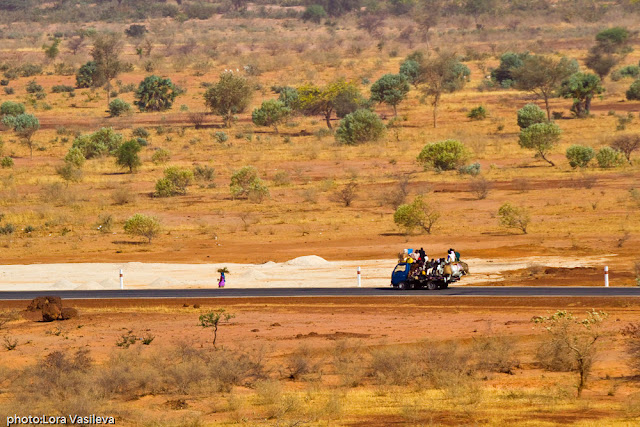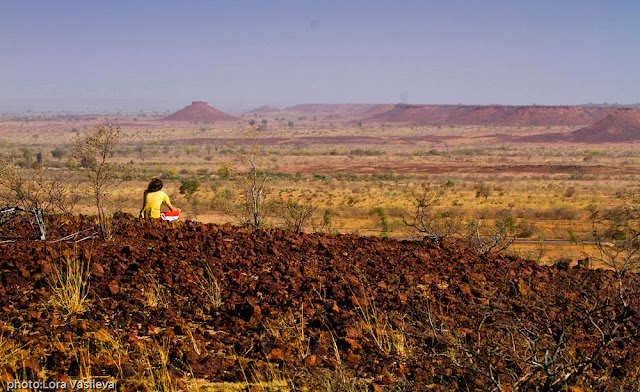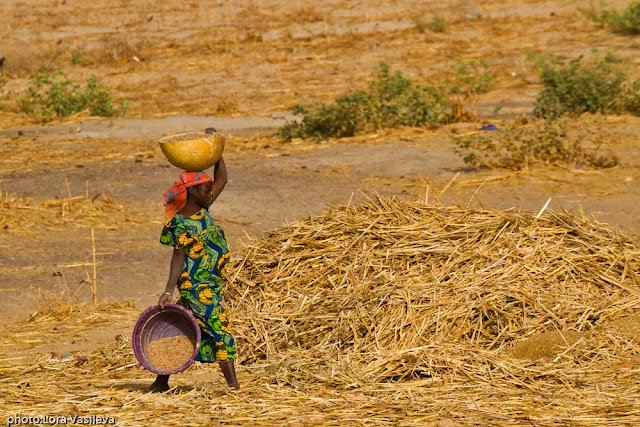We entered Niger after walking along the bridge over the Niger River. The border police-woman questioned why we have no car, how we got there and aren't we scared of lions and snakes as we sleep in the woods. In Niger, however, there was not a single lion, and we hadn't see any snakes until now. She also said that Nigeria is very dangerous but we already heard that repeatedly. We still remember our first night in Africa, Tangier when the Moroccan, whith whom we spent the first night , scratched a cross in Nigeria on our map and said: "Do not go to Nigeria! They will take everything from you, even shoes and will leave you barefoot and naked ... if they leave you alive" But we were headed that way to check are all these stories true. Actually we had to go through Nigeria only transit for 7 days.
The first night in Niger we spent near the border in a palm grove and in the morning we reached the first city-Gaya. The contrast with Benin was great - sand, mosques and midnight prayers and dusty harmatan wind again. Poverty and dirtyness were frustrating. There were no fruits and vegetables, unless expensive watermelons. The roads were even more broken and cars - even more overwhelmed. People did not want or could not speak French. Apparently they are not very fond of Frenchmen here. Only 2-3 months ago two Frenchmen were kidnapped and killed in bar Nyame. But otherwise the people were very nice to us and we had no problems.
We ate rice and hurried to get out of the wintry city. We stopped a truck on the awful road to Dosso and for the whole day we passed only 60 km. The road was as if last time they repaied it was in colonial times. Tired of the constant bumping and jumpng in the holes, we decided to stop to sleep nd continue the next day. The first truck in the morning was the Burkinabe and Beninoase that brought us to the border 2 days ago. They aropped us 7 km before Dosso before the police post. After Dosso the road was getting better, but almost no traffic. We stopped a Tuareg, who imported a car from Benin. Before he let let us in he asked us what we carry in our backpacks and said that normally he doesn't stop to anyone. Here people seem afraid to stop to strangers, especially when driving a newly imported car. We assured him that we are not thieves, we even learned a little tamachek (language of touaregs here) from him, but until the end could not trust us. When we asked him to stop in the bushes to drop us to spend the night there, he was very suspicios, he looked around, stopped just for a few seconds to leave us and we didn't have time to tell him bye. We slept in a strange spot in the endless dry field. The traffic stopped in the night and desert silence came. As villages have no electricity, the night was really dark. The area was flat and dry with beautiful stone hills here and there.
 |
| with the tuaregs |
The next morning we rode again with a touareg family who were very happy and wrote our names in their language, which we met before in Berbers in Morocco
This was the only African language that has writing here. (in East Africa only Ethiopian language has its own alphabet) There are hundreds of different African languages (only Nigeria has over 200 different languages) and none has its own writing. It's hard to imagine life without writing. The tuaregs left us in a village on the road to Maradi and there we ate rice and filled water. Here water is even more hard to find. Most villages had no pumps and people were pulling buckets out of 30-meter water holes. When we found water we took 7-8 liters, which were enough for half a day.
This was the only African language that has writing here. (in East Africa only Ethiopian language has its own alphabet) There are hundreds of different African languages (only Nigeria has over 200 different languages) and none has its own writing. It's hard to imagine life without writing. The tuaregs left us in a village on the road to Maradi and there we ate rice and filled water. Here water is even more hard to find. Most villages had no pumps and people were pulling buckets out of 30-meter water holes. When we found water we took 7-8 liters, which were enough for half a day.
Then we hitched a Nigerian who also imported a car from Cotonou. In fact, except trucks, imported cars from Cotonou and buses packed with people, there were no other vehicles. Even Nigerians preferred to cross over Benin and Niger, to avoid Lagos and the Niger Delta. We finally talked to someone in English and listened Fela Kuti. We talked about women in muslim world. Although he was an educated man, he tought that women can not control themselves. So you should marry to a young woman to take control on her on time. Then they have no right even to speak with another man while their husband is entitled to take another 3 women and is allowed to sleep with hundreds other. Their understanding of family, love and children were totally different from ours and it was difficult to understand. The theme was infinite and the dispute was meaningless. Soon night was coming and we stopped to camp somewhere. We had another quiet night by the road and the next morning began the saga of the truck.
We decided that we are near the last town Maradi - less than 80 km and the road was good, so we got the first truck that passed and slowly headed that way. We stopped at the first village to help another truck to replace a tire. After the tire was changed, we could not start the engine. Gas was finished. The truck, of course, didn't have any indicators working and on top of that the gear did not work properly and had to be switched with great force and load scratching. Our driver got on another truck and went looking for fuel. We waited an hour and something in the village where we ate local pancakes and drew water from the pump. The villages were small and people-very nice. Although most f them didn't speak ny French, they were very friendly and curious about us. Finally the driver came back with gasoline, but the truck would not start still. They started repairing something and after some time, just when we were thinking to continue with another vehicle, the engine finally started. We went slowly down the road and soon we saw again the truck with the flat tire, again with the same flat tire. This truck had a few tires which were wriggling under the weight of the heavy load. A place where normally had to have 4 tires, they had only one, usually very old and worn out. We picked te driver with the flat tire to the next village and so we were 6 people in the truck, which was our record so far. After another few miles we saw another colleague stopped right on the road.We stopped to talk to him, but our truck went off and so we blocked the whole road. Long time we couldn't start and sat in the middle of the road, giving signs to coming cars to stop. After some time we sarted, and after a few more minutes struggling with the gears, we went on. So all day we traveled those 80 km to Maradi and just when we entered the city the gasoline finished again. This time we went on by foot and left the truck saga.Imagine what adventure is all their route Cotonou-Maradi - more than 1500 km.
 |
| these houses are not for people, but for storage of grains |

 |
| at the water pump |
 |
| it is not easy to travel like this ... especially on a road with many potholes |


We slept in Maradi and the next day we reached the border with Nigeria. We camped near the border so we can get early in Nigeria. But alghtough we were at 8 o'clock on the police post we managed to get into Nigeria at 12. First officers of Niger side long questioned us and seemed unwilling to let us go. We wrote 2-3 times our data, profession, etc. Overall, the border police did not hurry, and besides us there were no other customers. Usually it took at least half an hour to write and talk before they put the stamp. Then it turned out that there are over 5 km no man's land to the other border, which we walked. There were even two villages between the borders and we wondered to what country they belonged. Finally we arrived to the Nigerian Police Post and big procedure began. First they checked bags for weapons, then took us to another building to write and to question us. There all of a sudden a policeman spoke in Bulgarian. It turned out that he used to live in Bulgaria and amazed us with African Bulgarian. We thought the procedure is over over and went on the road when a police car came, told us to get in the car and drove us back to the border, where they brought us to a third building and again began to write and ask. Finally they asked if we would not give anything for registration, but we refused. Finally at 12:00 we were officially in Nigeria and began hitching to Kano. There we had a couch-surfing friend from India and had to get there before dark. First a car drove us to the first city 4-5 km, then a shiny Peugeot 607 took us directly to Kano - 250 km. They were two Nigerien who spoke neither French nor English (only Hausa). They asked us some money and we agreed, we did not have much time, and travelling with them was quick and convenient. Only after 5 km we were stopped by the first police officers who checked our documents and asked what we bring them from Bulgaria. We responded that we bring smiles, but they were not very pleased. "Give me something! Water, gift anything! " We had nothing to give them, even our water was finished and just left them with a smile. Police posts were many on the road and this story was repeated many times. However, we reached Kano on time and without problems.
 |
| With Mayank and some of his friends |
Cleaning of sesame in Nigeria |
Mayank - our host welcomed us hospitably with Indian food and a shower. He had other friends visiting and it turned out a pretty fun night. They told us much about India and Nigeria, we exchanged movies and music and generally were very nice and open-minded people. Unlike most Africans, they were really impressed with our trip and said: "You do what we've always dreamed about but we could never do". Luckily it appeared that Mayank would travel the next day for work in Maiduguri. That was 600 km in our direction, almost to the border with Cameroon. So we crossed Nigeria for only three days without even feeling this country. Besides police and several colleagues of Mayank, we did not met many other Nigerians. We stayed one night in Maiduguri with Mayank and the next day we were in Cameroon. Long-awaited Cameroon, where we want to stay longer.There we will celebrate our birthdays - on April 8 Lora is becoming 30 and on April 13 Evgeni will be 25. Everyone is1 invited to a hot party in Cameroon!



































No comments:
Post a Comment